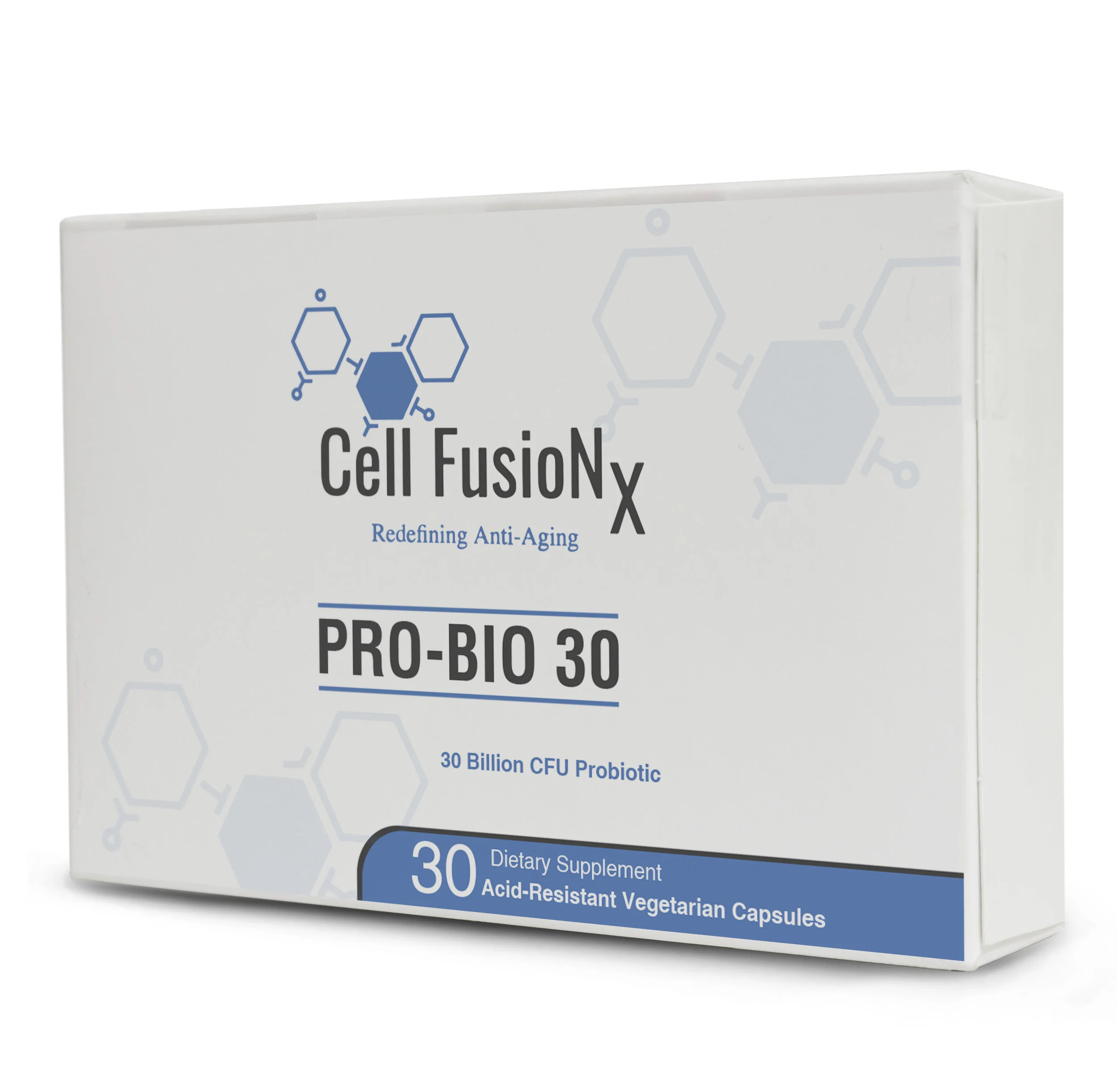Pro-Bio | 30


Pro-Bio | 30
Clinical Applications
• Helps Maintain a Healthy Intestinal Microecology*
• Supports the Natural Immune Response*
• Supports Bowel Regularity*
• Supports Lactose Digestion*
Pro-Bio 30 is a vegetarian, dairy- and gluten-free, four-strain probiotic totaling 100 billion CFU† per capsule. Each vegetarian capsule is sealed in nitrogen-purged aluminum blister packs to serve as protection from factors proven to compromise the stability of probiotics such as heat, moisture, and oxygen. Pro-Bio 30 provides four researched strains of beneficial bacteria, including the extensively studied HN019® strain of Bifidobacterium lactis. These live microorganisms have proven health benefits and well-established safety, and have been tested for epithelial cell adhesion and/or resistance to low pH.*
To further support resistance to low pH and the delivery of microorganisms to the small intestines, Cell FusioNX employs DRcapsTM gastro-resistant capsules. These specially designed, innovative capsules help slow exposure of actives to stomach acid and ensure more targeted release.*
Discussion
Supplementation with probiotics has many mechanisms of action that benefit health, including but not limited to: (1) supporting metabolic activity, such as the production of short-chain fatty acids and vitamins, nutrient absorption, and digestion of lactose; (2) adhering to intestinal epithelial cells to help maintain a healthy balance of organisms in the intestinal tract; (3) helping to establish populations of good bacteria after disruption in balance; (4) supporting immune function; (5) promoting intestinal epithelial cell survival; (6) supporting healthy bowel function; and (7) degrading oxalates.*[1-8]
Common challenges associated with probiotic supplementation are maintaining stability of the organisms during distribution and shelf life and, once taken by a consumer, survival of the organisms as they travel through the digestive tract so that they reach the target tissue (intestines) alive. To help ensure stability, Cell FusioNX packages the Pro-Bio 30 capsules in sealed, nitrogen-purged aluminum blister packs to serve as protection from factors proven to compromise the stability of probiotics, such as heat, moisture, and oxygen. Careful selection of organisms is another way Cell FusioNX helps ensure stability. Careful organism selection, as performed for Pro-Bio 30, is also a critical aspect of supporting digestive survival. To further support resistance to low pH and the delivery of microorganisms to the small intestines, Cell FusioNX employs DRcapsTM gastro-resistant capsules. These specially designed, innovative capsules help slow exposure of actives to stomach acid to promote a more targeted release.*
HOWARUTM (Bifidobacterium lactis HN019®) Discovered in 1899, B lactis play a key role in the human microflora throughout a person’s life. Researchers have identified strain HN019® as having excellent probiotic potential based upon its ability to survive the transit through the human gastrointestinal tract, adhere to epithelial cells, and proliferate.[6] B lactis HN019® has been extensively studied, and its safety and effectiveness is well accepted.[7,8] To assess the impact of Bifidobacterium lactis HN019® supplementation on whole-gut transit time in adults, 100 subjects were given daily doses for 14 days of 17.2 billion colony-forming units (CFU), 1.8 billion CFU, or placebo. Decreases in mean whole-gut transit time over the 14-day study period were statistically significant in the high-dose group and the low-dose group, but not in the placebo group.[8] This level of dosing also supported other parameters of healthy GI function, as were self-reported by patient survey.[8] In another study of preschool-age children, supplementing milk for one year with 1.9 x 10 CFU per day B lactis HN019® and 2.4 g/day of prebiotic oligosaccharides supported both healthy iron status and weight gain.[9] In a randomized, double-blind, placebo-controlled human dietary intervention study in elderly subjects (>60 yrs.), supplementary B lactis HN019® resulted in statistically significant increases in the beneficial organisms bifidobacteria and lactobacilli.*[10]
Lactobacillus acidophilus (Lactobacillus acidophilus La-14) This common inhabitant of the human mouth, intestinal tract, and vagina, is also found in some traditional fermented milks (e.g., kefir) and is widely used in probiotic foods and supplements. It has a history of safe human consumption. The L acidophilus La-14 strain is of human origin and has been identified as a type A1 L acidophilus. L acidophilus shows excellent adhesion to human epithelial cell-lines.*[11,12]
Lactobacillus plantarum (Lactobacillus plantarum Lp-115) This bacteria was isolated from plant material and is abundantly present in lactic acid-fermented foods, such as olives and sauerkraut. In vitro studies have shown that L plantarum strain Lp-115 has excellent adhesion to epithelial cell lines.[13] In addition, L plantarum is resistant to low pH conditions and survives the presence of bile at duodenal concentrations.*[13,14]
Bifidobacterium longum (Bifidobacterium longum Bl-05) The B longum Bl-05 strain is well accepted as safe for human consumption. B longum is resistant to low pH and bile salts and is well suited to the intestinal environment.*[14]
